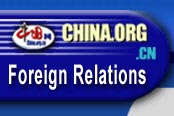The growing friendly ties between the Chinese Communist Party and the political parties of foreign countries will help promote China's economic development and its foreign relations in the new century, said a senior Party official recently.
The Party's contacts with political organizations across the world will also help safeguard national security, improve its international status and form an important component in the country's overall strategy for national reunification, according to Dai Bingguo, head of the International Department of the Central Committee of the Communist Party of China (CPC).
At the same time, the department will strive to serve as a think tank for the Party when it needs to consult on international development trends, Dai said.
Dai's department, as a key Party organ, plays a role similar to that of the foreign ministry in the central government. It maintains liaison with both the ruling and the non-ruling parties of foreign countries.
When the department was first established in 1951 - shortly after the Communist Party came into power in China - its main job was trying to break the blockade imposed on China by Western countries and to establish a new image for the Chinese Communist Party in world politics.
But the world has undergone a major shake-up in international relations, following intense competition among world powers in both the political and economic arenas during the latter decades of the 20th century, he said.
The department has devoted itself increasingly to active party-to-party exchanges to seek a development strategy that suits both international trends and the situation in China.
The Chinese Communist Party sent out 90 delegations to visit foreign countries and received over 130 visiting delegations last year, according to department officials.
Continued dialogue between high-ranking officials of the parties has not only deepened mutual understanding and trust but also helped promote co-operation in various fields, Dai said.
Foreign parties have got a clearer vision of China's reform blueprint and State policies, while the Communist Party of China has learned from the economic and social development experiences of other countries, he added.
The exchange has covered various issues including politics, trade co-operation, urban development, the media and publication industries, city planning, reform of administrative bodies, and the country's strategic exploitation of the landlocked western regions, according to Dai.
He said the department will continue to abide by the principles advocated by late Chinese leader Deng Xiaoping in its future development. Deng embraced the theory of handling party-to-party relations on the basis of the principles of independence, complete equality, mutual respect and non-interference in each other's internal affairs.
The Party at present has links with 380 parties and political organizations in 140 countries and regions, including some that do not have diplomatic relations with China.
(China Daily 01/23/2001)
